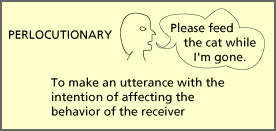
It is not easy to look at words and sentences and decide what they really mean. However, even if we have a way of deciding the meaning of sentences (or utterances) from the words they contain, we still have a problem. For example, many Japanese people say that they usually do not express themselves directly; their intended meaning is not simply the same as the meaning of the words in their utterances.

For another example, many British people say that they never really say what they are thinking! This can sometimes lead to confusion and misunderstanding. It is all very complicated. What is happening here?

Sentences often do not simply carry the meaning of the words they contain. For example, utterances can sometimes be more like actions than meanings. Consider this sentence/utterance:
1. I hereby name this ship H.M.S. Invincible.

In 1, an action seems to be taking place: a ship is given a name. Of course, it is also necessary that the person speaking has the right to perform this action. The person and the situation must be appropriate.
How about the following sentence?
2. There’s a huge spider on your head.

Sentence/utterance 2 does not simply carry the meaning of the words. It also acts as a warning.
How about the following?
3. Don’t do that!

Sentences like 3 seem to actually do things; they are not simply statements. We seem to have a distinction between the meaning of an utterance and its use in real situations. Also, it seems impossible to say whether these utterances are true or false (remember Propositional Logic and Predicate Logic?). Instead, we can only say whether or not they are appropriate in context.

Speech Act Theory suggests that there are three different speech acts that take place when people speak:

The Locutionary Act is the basic grammatical meaning, familiar from Predicate Logic.

The Locutionary Act is about the sentence before it is used to actually interact with someone. Before it is used in context, “Don’t do that” somehow addresses someone, but we don’t know who. It tells that person not to do something, but we don’t know what. Can you think of a Predicate Logic formula to express this?

The Illocutionary Act is central to Speech Act Theory; it describes what a speaker does by uttering a sentence. You might be commanding, promising, warning, threatening and so on. These acts can be explicit in sentences like the following:
4. I (hereby) command you to stop talking!

In sentence 4 it is very clear that the illocutionary act is a command. However, illocutionary acts are usually implicit.
The Perlocutionary Act is the effect that the utterance has on a listener.

Consider the following:
5. Please feed the cat while I am gone.
The Illocutionary Act is a command or request but the (intended) Perlocutionary Act is the listener giving food to the cat after the speaker has gone away. Of course, the Perlocutionary Act might be different from the one you intend. How could the intended Perlocutionary Act go wrong in 5?
Felicity Conditions

All Speech Acts have to satisfy Felicity Conditions; they have to be appropriate to the situation. Imagine you say, “I declare the Olympic Games open” while sitting on the toilet at home. Clearly, neither the person, the place, nor the time are appropriate to the successful performance of the act. Any other problems? Or imagine I say to you, “You spoke Japanese in class so I sentence you to three years in prison!” How about that?